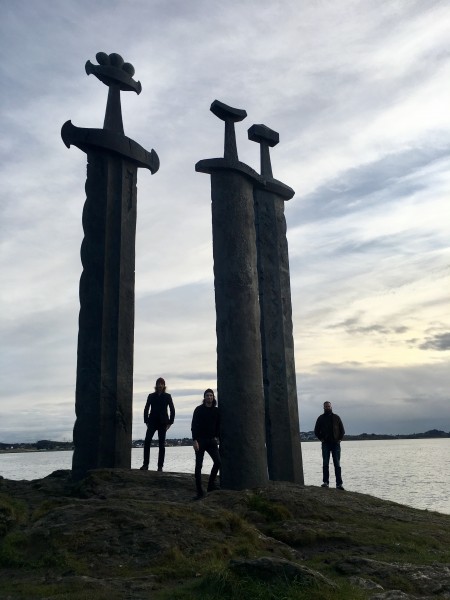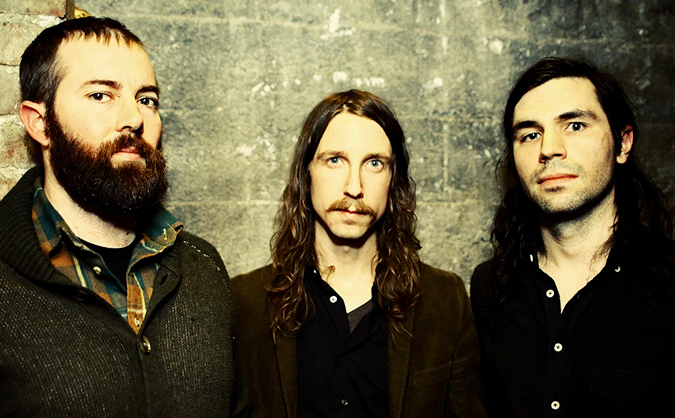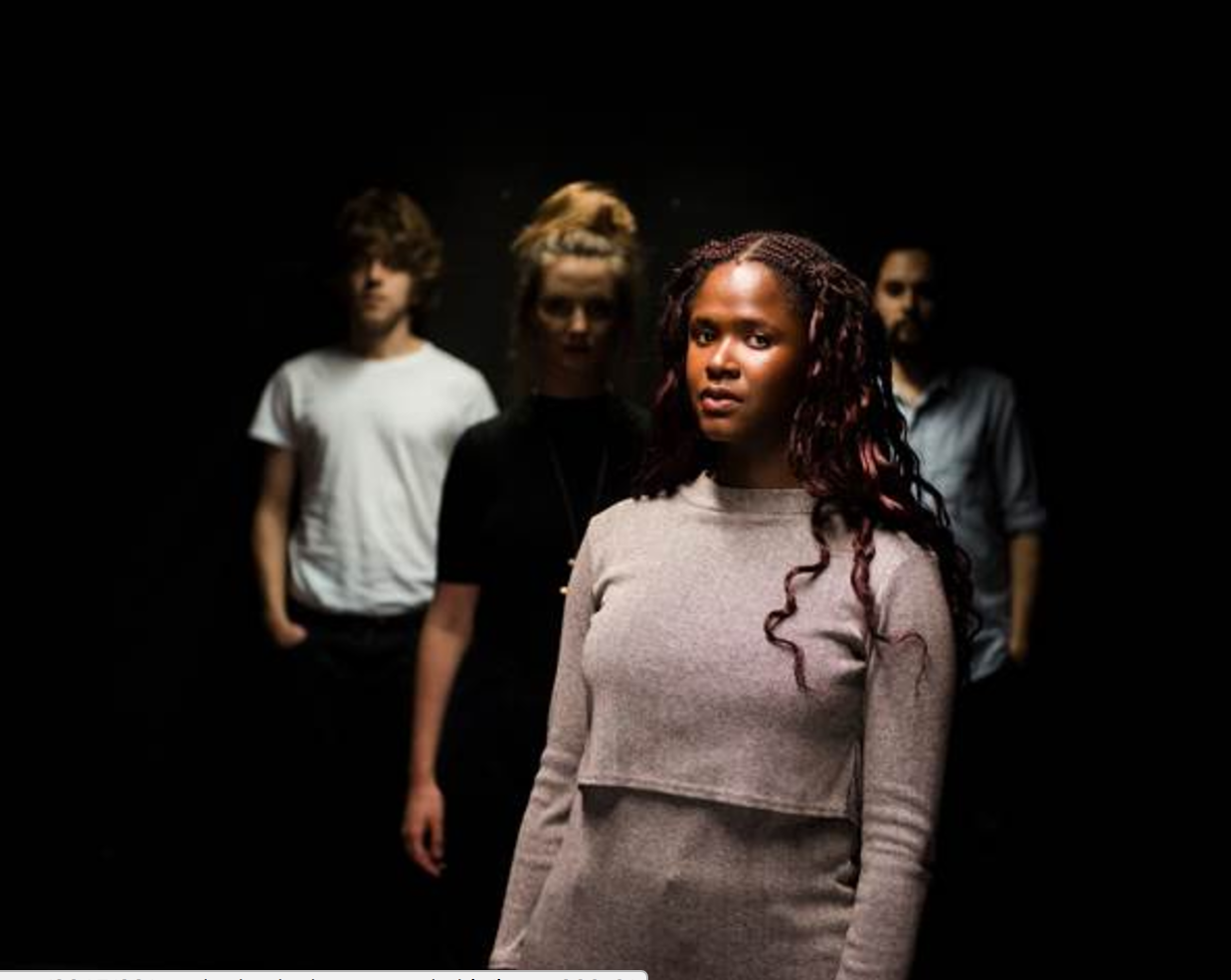Ahead of shows at Dublin’s Whelan’s on Wednesday, March 22 and Belfast’s Empire Music Hall the following night, Will Murphy speaks to Brian Cook, bassist with Chicago instrumental masters Russian Circles about touring, politics, their latest album, the ideal audience, the craft of songwriting and more.
Hi, Brian. How’s the road been treating you? The next few months look pretty exciting in terms of venues and nations, is there anywhere that you’re all particularly looking forward to? What will you be listening to stave off the monotony of touring?
Touring has been good. We took care of our headlining U.S. dates last fall, and we divided Europe into two tours this time around just because there were so many cities we wanted to hit. We did Scandinavia and Eastern Europe back in October and November, which was pretty exhausting, but overall a great experience. Sometimes you get so accustomed to hitting the same places over and over again that it becomes easy to take things for granted, then you wind up playing a few shows in Romania and it serves as a reminder that we’re very fortunate to be able to do what we do. Now we’re out doing Western Europe and the UK, which is very familiar territory for us. Not as much of an adventure, but rewarding to be back in cities where we have friends and know the lay of the land. In terms of music, I’ve sort of reverted back to the old school touring listening habits. It used to be that you’d go on tour with a half dozen cassettes or a small book of CDs, then the iPod made it so that you toured with your entire music library and you’d never listen to the same album twice on a six-week tour. Now I’m back to travelling with just a few albums on my phone. I’ve been listening to a lot of Sun City Girls, Fleetwood Mac’s Tusk, Michael Rother, and Lungfish on my headphones. There has also been more than a few spins of the new Power Trip, Oranssi Pazuzu, and Rotting Christ albums in the van.
I remember seeing you when you were last in Dublin. What struck me was how unwilling you were to rush anything. Everything took exactly as long as it was going to take. It was a really ballsy move, and I’m wondering has it ever backfired horribly?
The bigger problem is not allowing enough time. Mike and I have so many changes and adjustments we have to do between songs—different tunings, different guitars, different pedal settings, different Taurus settings—and we do it all while bridging the songs with interludes. Plus, there’s the whole thing of trying to squeeze in a swig of beer and a toweling down of the face between all of that. We used to tour with these auxiliary delay pedals at the end of our chain that served zero purpose other than to silently notifying the rest of the band that we were ready to go into the next song. If the red light on Mike’s delay pedal was on, we knew he was ready. Same for me. The only problem is that sometimes one of us would forget to turn it on, and we’d stand there waiting for nothing until the guilty party remembered to stomp on the pedal.
Is there ever a frustration performing to an audience, given that so much intricate detail is lost when you port the songs to a live context? With that in mind, do you prefer to spend your time in studio constructing these mini epics or letting them loose on the audience night after night?
I’m not sure what the ideal audience would be. I remember Fugazi talking about how their anti-moshing stance grew to such mythical proportions that it seemed like people were afraid to dance at their concerts. I can empathize with that—I hate seeing violent dancing, but it also feels like a lot more work to play when people are totally stoic. The happy medium is when people are physically moving to the music but also respecting their neighbors. At this point, I try to look out into the audience as little as possible, because that happy medium is so difficult to achieve. As far as writing versus performing, they are both gratifying. I don’t think I’d be happy doing just one or the other. I love performing music live. Most of my love of other peoples’ music comes from watching it—or envisioning it—unfolding in real time. So the process of making a song happen in the present, in a very specific environment and with a select audience, is really magical. But if you don’t love the composition side of music, you should just stick to being in a tribute band.
You recorded a trio of albums with Brandon Curtis, each of which was absolutely stellar. Yet for last year’s Guidance, you opted to go with Kurt Ballou. What inspired this change? Was there ever a concern that Ballou might not bring out the same level of performance that Curtis helped to unleash? How hands-on was he during the recording?
Working with Brandon was amazing. We were really drawn to his ability to capture space and dimension with this work with Secret Machines. He’s also just an incredibly knowledgeable musician. He was good set of ears and a really good sounding board for those three records. We opted to go with Kurt Ballou on Guidance simply because we wanted to try something new, and we knew Kurt would share a lot of our musical reference points. Whenever you hire someone to produce a record there’s always that concern over their level of involvement, particularly if you come from a punk background. You don’t want some outside party compromising your vision and trying to make your songs appeal to a broader audience. But our songs tend to be so malleable and go through so many permutations that we have come to value having that set of fresh ears that can hear the different variations and have an unbiased opinion on what works and what doesn’t. In that respect, both Kurt and Brandon were amazing. I think Kurt tended to be a bit more focused on shaping tones while Brandon tended to have more ideas in terms of composition, but they both definitely made their mark on our albums. I can’t speak highly enough of either of them.
A number of groups who’ve recorded with Ballou have talked about Salem being a deeply unsettling town, given the commercialisation of its brutal history. Did any sense of this permeate the songwriting?
Salem is a strange place. It shuts down early. We would stop recording around 8pm just because dinner options after 9pm were virtually non-existence, which was an adjustments considering that we’re from Chicago and New York, where you can eat whatever you want at pretty much any hour of the night. But the witch trials weren’t really something that loomed in the back of our minds during our time there. The juxtaposition of the tourism trade and the public inebriate population was far more jarring.

Your songs feel so meticulously planned and crafted. How long do spend with a single song? How do you know when it is ready or, if it’s the kind that’ll never be perfect, when, if ever, do you throw your hands up and say “fuck it, it’s good enough”?
Some songs come together really quickly. Some songs are labored over for months and months, right up to and through the recording process. The album is bookended by two compositions that were crafted by individual members of the band and transformed into full-band songs with a minimal amount of effort. Then there are songs like Vorel that are transforming even as we play them over the course of this tour. We have to set deadlines for recording otherwise we’d tinker with songs forever. There’s an old lesson I learned in a painting class: every twenty minutes, step away from your work to reassess where you’re at. Inevitably, you’ll step away at some point and realize it’s done and any additional brush strokes are just detracting from the immediacy of the work. It’s a similar thing with songs in the studio sometimes. Every once and awhile you’ll hear a playback and realize that any additional changes or embellishments are just going to diminish the impact of the song.
Tracks like Afrika and Lisboa suggested a focus on geopolitics and a wider cultural sphere. What made you choose these subjects? What was it about the Portuguese capital that inspired you?
I was definitely drawn to political bands when I was younger. I liked topical punk bands. I liked ‘60s protest music. Basically, I just liked bands that obviously gave a shit about the world and expressed some capacity for empathy. I hated love songs. I hated songs about dancing, or partying, or money. Of course, being too topical can make your music a bit dated. I love punk music from the early ‘80s, but it’s a little distracting to hear bands ranting against Reagan and Thatcher. We’re not an overtly political band; there isn’t really a way for us to do that as an instrumental group, but I do like infusing our records with imagery that has some sort of historical or political context, just because it harkens back to a lot of the music I was obsessed with during my formative years. As far as specific song titles, they have very specific meaning to us personally, but we prefer to keep those meanings unclear to the general public. That said, we’ve already mentioned this before in other interviews so I guess I can say it again here, Lisboa was given its title simply because Mike began putting the song together during some downtime on tour in Portugal.
Memorial featured some spellbinding vocals, whereas with Guidance you opted for a purely instrumental approach. What was the reasoning behind this? Are there any plans to bring in vocals for the next release?
We dabbled with vocals on Memorial and Praise Be Man because they seemed like interesting experiments. We have no plans of making vocals a recurring part of our method, but that isn’t to say we won’t feel compelled to explore the option in the future. I enjoy the fact that we can draw heavily from the world of underground metal, but I don’t think borrowing from the vocal styles of those bands would do anything to enhance our music. If anything, I think it would be a distraction. I think being an instrumental band has allowed us a lot more stylistic fluidity, and that is far more important to us than having a lyrical component to our music.
There’s a lot of darkness in the world currently. Trump and Muslim ban, Aleppo, the continued success of Nickelback. How, if at all, does the current state of affairs affect your songwriting?
Well, Guidance is ultimately a reference to our collective uncertainty. For the three of us in the band, it literally referred to a lot of uncertainty in our personal lives, but we tried to extrapolate that to a general sense of apprehension towards the future for the sake of the album. In that sense, “guidance” can refer to the mistaken notion that there is some sort of benevolent leadership out there that has the public’s best interests in mind, or it can refer more generally to the allure of some overarching answer to all our problems. It’s all a carrot on a stick. So it goes.
Finally, given the foreboding and gloom that your work is shrouded in, where and how do you find the inspiration for the more delicate elements of the tracks?
Being that we don’t all live in the same city, we spend a lot of time writing independently. And while we all write with the idea of crafting songs that lend themselves to the darker and louder end of our spectrum, we don’t shut out any ideas that may come up. When you’re playing your instrument alone in your room, a lot of times the quieter and mellower stuff winds up sounding a lot more satisfying than the paired-down versions of the heavier stuff. For example, Asa was not meant to be a Russian Circles song, but those notes sounded good together and it turned into a little song, and I forwarded it along to the other guys in the band just because we have a pretty open sharing policy with our music. And it wound up being something that resonated with Mike and Dave. Overboard was actually two separate songs that were written completely independently by Mike and I and they just happened to fit together. So while we never deliberately set out to write those kinds of songs, sometimes they just happen.
Photos by Ryan Russell and Tomas Mladek.






